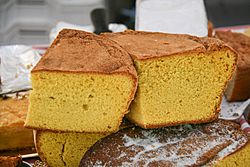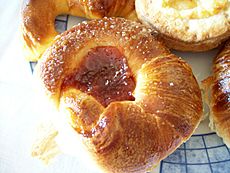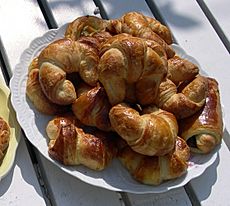Bizcocho facts for kids

A bizcocho from Asturias, Spain.
|
|
| Type | Pastry, cake cookies |
|---|---|
Bizcocho (pronounced "bees-KOH-cho") is a Spanish word for many different kinds of baked goods. These can be pastries, cakes, or cookies. What "bizcocho" means changes a lot depending on the country you are in.
For example, in Spain, bizcocho is only used for sponge cake. But in Uruguay, it means most buttery, flaky pastries, including croissants. There, a sponge cake is called bizcochuelo. In Chile, the Dominican Republic, and Bolivia, bizcocho is a sweet dough baked with local ingredients. This is similar to the Spanish bizcocho. In Ecuador, a bizcocho can be either sweet or salty. The US state of New Mexico uses a smaller version of the name, bizcochito, for a very popular local cookie.
Contents
The History of Bizcocho
The word bizcocho comes from a Latin phrase. It means "cooked twice." This is why these baked goods were often soaked in wine long ago. They were quite dry because they were cooked twice.
The bizcocho in Uruguay might be linked to German pastries. Some people believe it came from a pastry called krapfen. German immigrants brought this pastry to the Río de la Plata region.
Other stories say that the bizcocho came from a mix of French and Spanish baking styles. Records show that the first bakers in Montevideo, Uruguay, were from France and Spain. For example, the puff pastry croissant, which is a type of bizcocho in Uruguay, was invented in France. Its first recipe was written down in 1905.
Different Kinds of Bizcochos
There are many popular types of bizcochos:
- Bizcochito: This is a cookie from New Mexico in the USA. It tastes like anise and cinnamon. It was first made in the Spanish colonial times.
- Bizcocho de soletilla: In Spain, these are known as ladyfinger biscuits.
- Croasanes or Croissants: In Uruguay, croissants are called bizcocho. Sweet croissants can have fillings like chocolate, pastry cream, or dulce de leche. Savory ones might have cheese, ham, or salami.
- Galletas dulces: These are sweet cookies that come from an older pastry. They have a layer of caramel and sugar on top. In Uruguay, they are also called bizcochos.
- Margaritas: These are a type of croissant found in Uruguay and Argentina. Their ends are joined to form a circle, like a flower. The middle space is filled with a sweet cream or fruit paste. They are topped with sugar. Margaritas are named after the daisy flower, which is called "margarita" in Spanish.

- Ojitos: These are round cookies from Uruguay. They have a space in the middle filled with a sweet fruit paste.
- Pan con grasa: This is another type of bizcocho from Uruguay. It is a kind of bread, sometimes called cañón.
- Polvorones: These cookies can be plain or flavored with cocoa. Some are made with half plain dough and half cocoa dough. Polvorones first came from Spain.
- Sponge cake: In Spain, sponge cake is called bizcocho. It can be made with chocolate, lemon, or yogurt.
- Vigilantes: These are another sweet type of croissant. They are long and thin, with sugar on top.
Bizcocho Around the World
Costa Rica
In Costa Rica, bizcochos are made with a type of corn dough called masa. They also have spices and/or cheese. People eat them as a snack, especially during coffee breaks.
Mexico
In Mexico, bizcocho is often used as another word for pan dulce, which means "sweet bread."
Philippines
In the Philippines, biscocho (also spelled biskotso) is a type of bread. It is usually stale bread that is baked again until it becomes crunchy.
Uruguay
Bizcochos are a very important part of Uruguayan culture. They are often eaten with mate (a traditional drink), coffee, or tea. People enjoy them for breakfast or merienda (afternoon tea). They are also common when friends meet, especially in parks, squares, beaches, or along the coastline.
You can buy bizcochos at panaderías (bakeries). There are even special shops called bizcocherías that only sell bizcochos.
Puerto Rico
In Puerto Rico, any type of cake is called a bizcocho. This is unless it has a special name, like "tres leches" cake.
See also
 In Spanish: Bizcocho (Uruguay) para niños
In Spanish: Bizcocho (Uruguay) para niños
 | Calvin Brent |
 | Walter T. Bailey |
 | Martha Cassell Thompson |
 | Alberta Jeannette Cassell |


